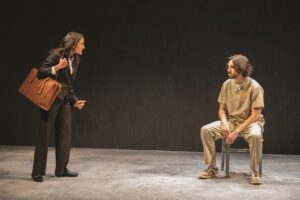The playwright and sometime actor Stephen Adly Guirgis (pronounced GEER-giss, with hard Gs) is a major theatrical talent who isn’t nearly as well known as David Mamet, although Guirgis’s rhythmic, contrapuntal dialogue and rampant profanity make them brethren of a sort. Guirgis’s play Between Riverside and Crazy won the Pulitzer Prize in 2015, and his oft-bleeped title The Motherf**ker With the Hat, starring Chris Rock and Bobby Cannavale, was Tony-nominated on Broadway in 2013. Guirgis is closely associated with his late friend Philip Seymour Hoffman — they were both key figures in the LAByrinth Theater Company in Manhattan. Hoffman directed the original production of Guirgis’s play Jesus Hopped the ‘A’ Train at LAByrinth in 2000, and now the Wellfleet Harbor Actors Theater has brilliantly revived it to open its 2023 season.

Jesus Hopped the ‘A’ Train is a profoundly difficult play to perform at two-hours-plus without intermission. Set in New York City’s Rikers Island prison, it’s a meeting of minds among two inmates, their two guards, and a court-appointed defender. It’s less about the law and the brutality of jails than it is about moral responsibility, redemption, and God’s plan. There’s not a lot of action but, instead, long passages of dialogue and monologue (with characters talking to the audience, not to themselves). Yet it unfolds briskly and intensely, and the WHAT production, directed by Sherri Eden Barber with scenic and lighting design by WHAT’s producing artistic director, Christopher Ostrom, is executed flawlessly and evocatively.
The five actors’ performances on the Julie Harris Stage are dazzling in their physical and verbal grace. Puerto Rican-born Pedro Gonzalez, a recent graduate of Fordham University, plays Angel Cruz, the central figure of the play, a street-smart Latino youth who has been arrested for shooting a Reverend Moon-like cult figure, ultimately killing him. Angel believes the reverend “stole” his childhood buddy and brainwashed him; his violent act is intended as retribution, which he feels is well deserved. He opens the play by fumbling the Lord’s Prayer to humorous effect, yet it’s not clear what he’s praying for. Gonzalez as Angel is revelatory — pensive and desperate, by turns tender and combative, and always quick-witted and thoughtful.

After being beaten and raped (offstage), Angel is put in solitary alongside Lucius Jenkins, a self-described African American schizophrenic serial killer with a heroin-and-cocaine-addicted past in Miami who has now found God and sobriety in prison. He’s serving a life sentence for murders committed in New York and is fighting extradition to Florida for earlier grisly crimes and likely execution. Lucius is played by Shakur Tolliver, an experienced actor who soars in the role: he turns Guirgis’s prose into an arpeggio of uninhibited confession, retaining a defensive edge yet rapturous in his newfound embrace of life. He gains one’s sympathy and admiration in a way that’s almost alchemical — this is not your usual creepy serial killer.
Shepherding these prisoners are two guards — one who’s sensitive, Charlie (Drae Campbell), and the other, Valdez (John J. Concado), his sadistic and vengeful replacement. Charlie’s kindness towards and appreciation of Lucius is infectious, and Campbell goes a long way to giving the play’s inherent contradictions an emotional basis. Concado makes Valdez a charismatic villain who likewise helps us navigate the multifaceted nature of crime, guilt, and hypocrisy in the play.
Lastly, there’s Angel’s lawyer, Mary Jane Hanrahan, played by Jessie Cannizzaro, who sizzles with personal and professional frustration and toughness. Mary Jane gives the narrative a push and an extra twist as she connives to get Angel off the hook with false testimony.

Guirgis, the son of an Egyptian father and Irish American mother, grew up, like Angel, on the Upper West Side of Manhattan. Also like Angel, he watched a good friend get drawn into a cult, which he has said was an inspiration for the play. He has done extensive work with prisoners. Even so, Jesus Hopped the ‘A’ Train feels more like a feverish projection of his fears and emotions than a realistic play about crime and punishment. The spiritual debate among the characters — about criminal violence, truth, and morality — is what animates the play, not the crimes themselves or Angel’s trial, which happen offstage. Threading through it all is the “light” of God’s will and forgiveness, best evidenced in Lucius’s attitude toward the sun and in Angel recalling an incident in the subway tunnels that gives the play its title.
WHAT’s riveting production makes the most of this. Ostrom’s stage feels like a modern dungeon, with chiaroscuro lighting and walls moving in and out to reflect the weight of confinement. Props are minimal, and invisible cages keep the inmates in place. Barber has directed her consummate cast with an invisible hand and perfect timing, from the blackouts that punctuate the scenes to the flow of potentially awkward monologues.
The language can be assaultive, and there are macho and homophobic elements to the play that will offend many. But that shouldn’t stop you from going to see it. It’s an indelible experience and a momentous launch for WHAT’s new season.
Killer Theater
The event: Jesus Hopped the ‘A’ Train, a play by Stephen Adly Guirgis
The time: Through June 17: Tuesday through Saturday at 8 p.m.
The place: Wellfleet Harbor Actors Theater, 2357 Route 6
The cost: $42.50; seniors, $38.50; students and balcony, $17.50; at what.org or 508-349-9428
